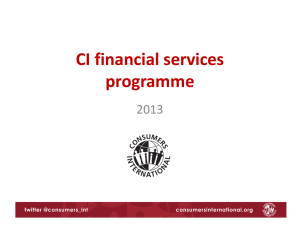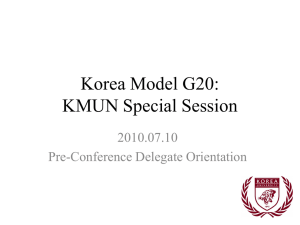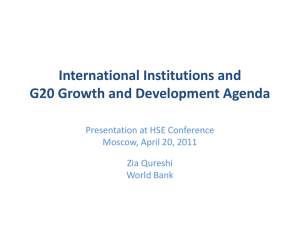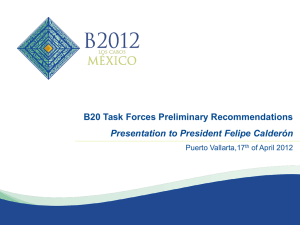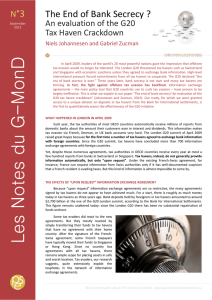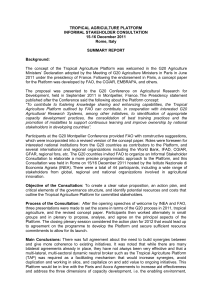G20 Summit Communique_2014.FINAL
advertisement
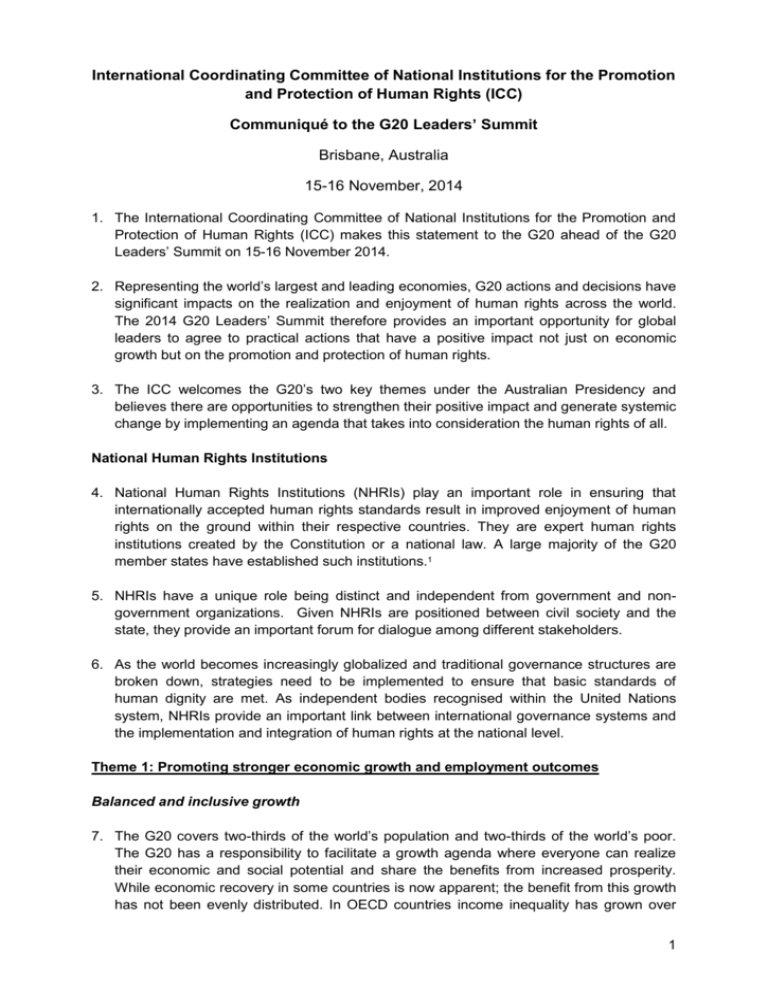
International Coordinating Committee of National Institutions for the Promotion and Protection of Human Rights (ICC) Communiqué to the G20 Leaders’ Summit Brisbane, Australia 15-16 November, 2014 1. The International Coordinating Committee of National Institutions for the Promotion and Protection of Human Rights (ICC) makes this statement to the G20 ahead of the G20 Leaders’ Summit on 15-16 November 2014. 2. Representing the world’s largest and leading economies, G20 actions and decisions have significant impacts on the realization and enjoyment of human rights across the world. The 2014 G20 Leaders’ Summit therefore provides an important opportunity for global leaders to agree to practical actions that have a positive impact not just on economic growth but on the promotion and protection of human rights. 3. The ICC welcomes the G20’s two key themes under the Australian Presidency and believes there are opportunities to strengthen their positive impact and generate systemic change by implementing an agenda that takes into consideration the human rights of all. National Human Rights Institutions 4. National Human Rights Institutions (NHRIs) play an important role in ensuring that internationally accepted human rights standards result in improved enjoyment of human rights on the ground within their respective countries. They are expert human rights institutions created by the Constitution or a national law. A large majority of the G20 member states have established such institutions.1 5. NHRIs have a unique role being distinct and independent from government and nongovernment organizations. Given NHRIs are positioned between civil society and the state, they provide an important forum for dialogue among different stakeholders. 6. As the world becomes increasingly globalized and traditional governance structures are broken down, strategies need to be implemented to ensure that basic standards of human dignity are met. As independent bodies recognised within the United Nations system, NHRIs provide an important link between international governance systems and the implementation and integration of human rights at the national level. Theme 1: Promoting stronger economic growth and employment outcomes Balanced and inclusive growth 7. The G20 covers two-thirds of the world’s population and two-thirds of the world’s poor. The G20 has a responsibility to facilitate a growth agenda where everyone can realize their economic and social potential and share the benefits from increased prosperity. While economic recovery in some countries is now apparent; the benefit from this growth has not been evenly distributed. In OECD countries income inequality has grown over 1 past decades and is now at its highest level in over 50 years.2 This persistent level of global inequality compounded with increasing unemployment highlights the need to restore growth in a way that is balanced, sustainable and inclusive. 8. The ICC recalls the outcomes of the 2013 G20 Summit in St Petersburg, and welcomes the G20’s commitment to inclusive growth.3 We call on the G20 to monitor and track progress against this commitment, and publicly report at future meetings. 9. High levels of inequality place economic growth and political stability at risk;4 it is also incompatible with the achievement of human rights. These rights are enshrined in the Universal Declaration of Human Rights and the many legally-binding international human rights treaties that followed. As duty-bearers, G20 leaders have an obligation under international human rights law to implement these principles in their economic decision making. 10. Human rights are critical to achieving inclusive growth in that they provide a framework for addressing the inequality, discrimination, exclusion and powerlessness that are often at the root cause of poverty. We encourage the G20 to recognize that inclusive growth is broader than income; it is about ensuring full participation of all segments of society in decision making processes and governance structures and adopting elements that eliminate social exclusion, discrimination and marginalization. 11. Achieving sustainable and inclusive growth means balancing economic, social and environmental concerns. Negotiations on the Post-2015 Development Agenda are entering the most critical phase and risks remain that opportunities to protect and promote human rights could be missed. The ICC encourages the G20 to pursue a Post2015 Development Agenda that: integrates all human rights (civil, political, economic, social and cultural) in both process and substance; is underpinned by the imperative of equality, takes into account marginalized, disempowered and excluded groups; is universally applicable; provides accountability mechanisms and extends to private actors.5 Recommendation 1: That G20 Leaders seize the opportunity to prioritize human rights in their discussions and recognize their human rights obligations in all decision making processes and outcomes. Recommendation 2: That the G20 recognize the link between the realization of human rights and inclusive growth, and long term political and social stability, and commit to actions that address drivers and barriers of sustainable, inclusive and balanced growth. Recommendation 3: That the G20 track efforts and progress in achieving inclusive growth and produce publicly available reports at future G20 Summits. Recommendation 4: That the G20 pursue a Post-2015 Development Agenda that integrates human rights in both process and substance; is underpinned by the imperative of equality; takes into account marginalized, disempowered and excluded groups; is universally applicable; provides accountability mechanisms and extends to private actors. 2 Equal opportunity and employment 12. The ICC welcomes the G20’s commitment to job creation in 2014 as unemployment and underemployment are key causes of poor economic growth and social development. We encourage the G20 to implement strategies to boost employment levels, address long term unemployment and lift workforce participation for women and youth. In doing so the G20 must recognize and understand that discrimination and inequality can be barriers to employment, and job creation will not be sustainable without addressing the legal, social and cultural barriers that prevent people from meaningfully and actively participating in the workforce. 13. We encourage the G20 to focus not only on job creation, but the creation of decent work. That is, full and productive work in conditions of freedom, equality, security and human dignity.6 The creation of decent work is increasingly recognized as a key approach to sustainable development, and is a means to strong and inclusive economies.7 14. It is now well understood that gender equality, empowerment of women and women’s human rights are essential to economic and social development. Investment in women and their participation in the labour market will have a multiplier effect on productivity, efficiency and sustained economic growth.8 For women to be genuinely integrated in the labour force they must not be involuntarily confined to part-time employment and to lowpaid and vulnerable jobs;9 barriers to their participation including discrimination and violence must be removed; gender pay gaps must be reduced; and unpaid care work must be properly recognized, valued and redistributed. 15. The ICC welcomes the G20’s commitment to youth unemployment, a critical issue given the alarming rise globally.10 We encourage the G20 to build on previous discussions and take action to enhance meaningful and decent employment opportunities for the world’s youth. We further call on the G20 to strengthen mechanisms for participation of young people in the decisions and processes that affect them and invest in social infrastructure to ensure that all young people have access to education, training and skill development. Recommendation 5: That the G20 implement job creation strategies that address the structural barriers to employment, and take action to enhance the participation of women in the workforce and the economy, and reduce youth unemployment. Theme 2: Making the global economy more resilient to deal with future shocks Strengthening tax systems 16. Payment of taxes and collection of revenue is critical to delivering vital services such as healthcare, sanitation, housing and safe drinking water among others. Without an effective taxation system many governments are unable to meet their human rights obligations. Many G20 based companies operate in countries where they do not pay an appropriate or fair share of taxes. To assist developing countries advance economic growth and human rights it is important that the G20 address the issue of income tax evasion and avoidance. The ICC encourages the G20 to consider a strategic and coordinated approach to international tax policy and implement the OECD recommendations to combat tax evasion by multinational enterprises.11 3 17. A robust and efficient tax system is one that is founded in principles of transparency, accountability and participation. The ICC further encourages the G20 to promote good governance in tax matters to ensure that tax systems are efficient, effective and nondiscriminatory in the collection of taxes and distribution of revenue. Recommendation 6: That the G20 promote good governance to ensure tax systems are effective, transparent and non-discriminatory in nature, and implement strategies to minimize tax evasion and avoidance by multinational corporations. Advancing human rights through business activity 18. Private sector activity is essential for economic growth; it also plays an important role in the realization of human rights worldwide. In emerging markets, responsible corporate behaviour can make a positive contribution to the rule of law, governance structures and sustainable development. The UN Guiding Principles on Business and Human Rights (UN Guiding Principles) provide a global standard for addressing adverse human rights impacts of private sector activity. These principles outline the state duty to protect human rights; the corporate duty to respect them and the need for access to remedies. 19. We encourage the G20 to build on the progress to date in addressing the impact that the private sector can have on human rights and support businesses to give effect to their responsibilities under the UN Guiding Principles. 20. Like all international standards, the effectiveness of the UN Guiding Principles depends on their implementation at the national level. To this end, a number of G20 Members have made a commitment to implement the UN Guiding Principles and other business and human rights frameworks through the development of a National Action Plan (NAP) on business and human rights. A NAP can assist governments to meet their obligations under the UN Guiding Principles but it can also provide clear and coherent guidance to business and assistance in generating a ‘level playing field’ for business to operate on. Recommendation 7: That the G20 promote the UN Guiding Principles and other global standards to address the adverse business related human rights impacts and ensure that corporate conduct respects internationally recognized human rights. Recommendation 8: That G20 Members implement the UN Guiding Principles through the development of National Action Plan on Business and Human Rights. The importance of NHRIs, civil society and G20 related groups 21. Inclusive growth is about participation, equal access to development opportunities and benefit-sharing, it cannot be achieved without partnerships and joint actions between civil society, NHRIs, business and government. The ICC commends the Australian Government and the G20 Secretariat for the positive road-map for engagement in 2014, and encourages enhanced collaboration between the G20 and other groups including L20, C20, B20, Y20 and G(irls)20. 22. The unique role of NHRIs means that they are relevant and essential in global governance structures. NHRIs have extensive experience of promoting greater understanding, awareness and respect for human rights among all those involved in sustainable and inclusive development including governments, international 4 organisations or private actors. NHRIs should therefore be considered as important partners in strengthening economies and delivering balanced and inclusive growth. We encourage the G20 to look for opportunities to engage with NHRIs and consider developing a platform for formal engagement in future G20 processes. Recommendation 9: That the G20 continue the positive dialogue with civil society and related groups, and ensure there are formal mechanisms for engagement in future G20 Summits. Recommendation 10: That the G20 strengthen engagement with NHRIs and explore opportunities for formal NHRI participation in future G20 processes. Conclusion 23. A prosperous G20 that respects and protects human rights means sustainable economic activity, inclusive growth and promotion of decent work and equal employment opportunities. The ICC remains ready to assist the G20 leaders and is willing to collaborate and explore opportunities to develop economic infrastructure that takes into account principles of respect, equality and participation. 24. The ICC appreciates the opportunity to submit this communiqué to the G20 Leaders’ Summit and encourages the G20 to give due consideration to the recommendations within it. Recommendation 1: That G20 Leaders seize the opportunity to prioritize human rights in their discussions and recognize their human rights obligations in all decision making processes and outcomes. Recommendation 2: That the G20 recognize the link between the realization of human rights and inclusive growth, and long term political and social stability, and commit to actions that address drivers and barriers of sustainable, inclusive and balanced growth. Recommendation 3: That the G20 track efforts and progress in achieving inclusive growth and produce publicly available reports at future G20 Summits. Recommendation 4: That the G20 pursue a Post-2015 Development Agenda that integrates human rights in both process and substance; is underpinned by the imperative of equality; takes into account marginalized, disempowered and excluded groups; is universally applicable; provides accountability mechanisms and extends to private actors. Recommendation 5: That the G20 implement job creation strategies that address the structural barriers to employment, and take action to enhance the participation of women in the workforce and the economy, and reduce youth unemployment. Recommendation 6: That the G20 promote good governance to ensure tax systems are effective, transparent and non-discriminatory in nature, and implement strategies to minimize tax evasion and avoidance by multinational corporations. Recommendation 7: That the G20 promote the UN Guiding Principles and other global standards to address the adverse business related human rights impacts and ensure that corporate conduct respects internationally recognized human rights. 5 Recommendation 8: That G20 Members implement the UN Guiding Principles through the development of National Action Plan on Business and Human Rights. Recommendation 9: That the G20 continue the positive dialogue with civil society and related groups, and ensure there are formal mechanisms for engagement in future G20 Summits. Recommendation 10: That the G20 strengthen engagement with NHRIs and explore opportunities for formal NHRI participation in future G20 processes. 1 Argentina, Australia, Canada, France, Germany, India, Indonesia, Korea, Mexico, Russia, South Africa, United Kingdom. There are an additional 16 EU Member States with accredited NHRIs: Austria, Belgium, Bulgaria, Croatia, Denmark, Greece, Ireland, Luxemburg, Netherlands, Poland, Portugal, Romania, Slovakia, Slovenia, Spain, Sweden. 2 Organisation for Economic Co-operation and Development (OECD) (2014). Social and welfare issues: Inequality, http://www.oecd.org/social/inequality.htm (viewed 13 October 2014). 3 G20. 2013 St Petersburg, https://www.g20.org/about_g20/past_summits/2013_st_petersburg (viewed 16 October 2014. 4 International Monetary Fund (2014).Staff Discussion Note: Redistribution, Inequality, and Growth. Prepared by Jonathan D. Ostry, Andrew Berg, Charalambos G. Tsangarides. At http://www.imf.org/external/pubs/ft/sdn/2014/sdn1402.pdf (viewed 4 October 2014). 5 International Coordinating Committee of National Institutions for the Promotion and Protection of Human Rights (ICC) (2014). Joint statement of National Human Rights Institutions concerning the Post 2015 Development Agenda, 13 October 2014. At http://www.humanrights.dk/files/media/dokumenter/business/icc_chairperson_letter_on_sdg_1510201 4.pdf (viewed 16 October 2014). 6 International Labour Organisation (ILO) (2008). Declaration on Social Justice for a Fair Globalization adopted at the 97th Session, Geneva, 10 June 2008. At http://ilo.org/wcmsp5/groups/public/--dgreports/---cabinet/documents/genericdocument/wcms_099766.pdf (viewed 16 October 2014). 7 International Labour Organization (ILO) (2013). The post-2015 sustainable development agenda, 319th Session, Geneva, 16–31 October 2013, ILO Doc GB.319/INS/4. At http://www.ilo.org/wcmsp5/groups/public/---ed_norm/--relconf/documents/meetingdocument/wcms_221635.pdf (viewed 16 October 2014). 8 UN Commission on the Status of Women, 58th Session Agreed Conclusions (2014), UN Doc E/CN.6/2014/L.7, para 13. At http://www.unwomen.org/co/csw/csw58-2014 (viewed 5 May 2014) 9 International Labour Organization (ILO), the International Monetary Fund (IMF), the Organisation for Economic Co-operation and Development (OECD) and the World Bank Group (2014). Report prepared for the G20 Labour and Employment Ministerial Meeting held in Melbourne, Australia, 10-11 September 2014. At http://www.ilo.org/wcmsp5/groups/public/---dgreports/---dcomm/--publ/documents/publication/wcms_305422.pdf (viewed 16 October, 2014). 10 In 2013 as many as 73 million young people are estimated to be unemployed, and many more are exposed to poverty through informal employment. See, International Labour Organization (ILO) (2013), Global Employment Trends for Youth 2013: A generation at risk. At http://www.ilo.org/wcmsp5/groups/public/---dgreports/--dcomm/documents/publication/wcms_212423.pdf (viewed 14 October, 2014). 11 Organisation for Economic Co-operation and Development (OECD) (2014). First recommendations for a co-ordinated international approach to combat tax avoidance by multinational enterprises, http://www.oecd.org/tax/oecd-releases-first-beps-recommendations-to-g20-for-international-approachto-combat-tax-avoidance-by-multinationals.htm (viewed 14 October, 2014). 6

